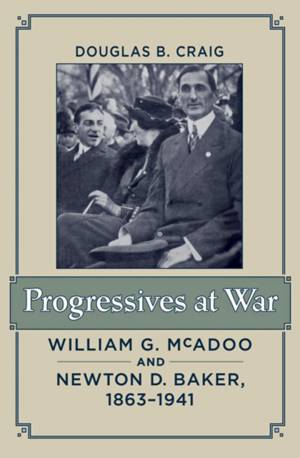
- Afhalen na 1 uur in een winkel met voorraad
- Gratis thuislevering in België vanaf € 30
- Ruim aanbod met 7 miljoen producten
- Afhalen na 1 uur in een winkel met voorraad
- Gratis thuislevering in België vanaf € 30
- Ruim aanbod met 7 miljoen producten
Progressives at War
William G. McAdoo and Newton D. Baker, 1863-1941
Douglas B CraigOmschrijving
Craig's study of McAdoo and Baker illuminates the aspirations and struggles of two prominent southern Democrats.
In this dual biography, Douglas B. Craig examines the careers of two prominent American public figures, Newton Diehl Baker and William Gibbs McAdoo, whose lives spanned the era between the Civil War and World War II.
Both Baker and McAdoo migrated from the South to northern industrial cities and took up professions that had nothing to do with staple-crop agriculture. Both eventually became cabinet officers in the presidential administration of another southerner with personal memories of defeat and Reconstruction: Woodrow Wilson. A Georgian who practiced law and led railroad tunnel construction efforts in New York City, McAdoo served as treasury secretary at a time when Congress passed an income tax, established the Federal Reserve System, and funded the American and Allied war efforts in World War I. Born in the eastern panhandle of West Virginia, Baker won election as mayor of Cleveland in the early twentieth century and then, as Wilson's secretary of war, supervised the dramatic build-up of the U.S. military when the country entered the Great War in Europe.
This is the first full biography of McAdoo and the first since 1961 of Baker. Craig points out similarities and differences in their backgrounds, political activities, professional careers, and family lives.
Craig's approach in Progressives at War illuminates the shared struggles, lofty ambitions, and sometimes conflicted interactions of these figures. Their experiences and perspectives on public and private affairs (as insiders who nonetheless were, in some sense, outsiders) make their lives, work, and thought especially interesting. Baker and McAdoo, in league with Wilson, offer Craig the opportunity to deliver a fresh and insightful study of the period, its major issues, and some of its leading figures.
Specificaties
Betrokkenen
- Auteur(s):
- Uitgeverij:
Inhoud
- Aantal bladzijden:
- 552
- Taal:
- Engels
Eigenschappen
- Productcode (EAN):
- 9781421407180
- Verschijningsdatum:
- 1/05/2013
- Uitvoering:
- Hardcover
- Formaat:
- Genaaid
- Afmetingen:
- 163 mm x 236 mm
- Gewicht:
- 952 g

Alleen bij Standaard Boekhandel
Beoordelingen
We publiceren alleen reviews die voldoen aan de voorwaarden voor reviews. Bekijk onze voorwaarden voor reviews.











